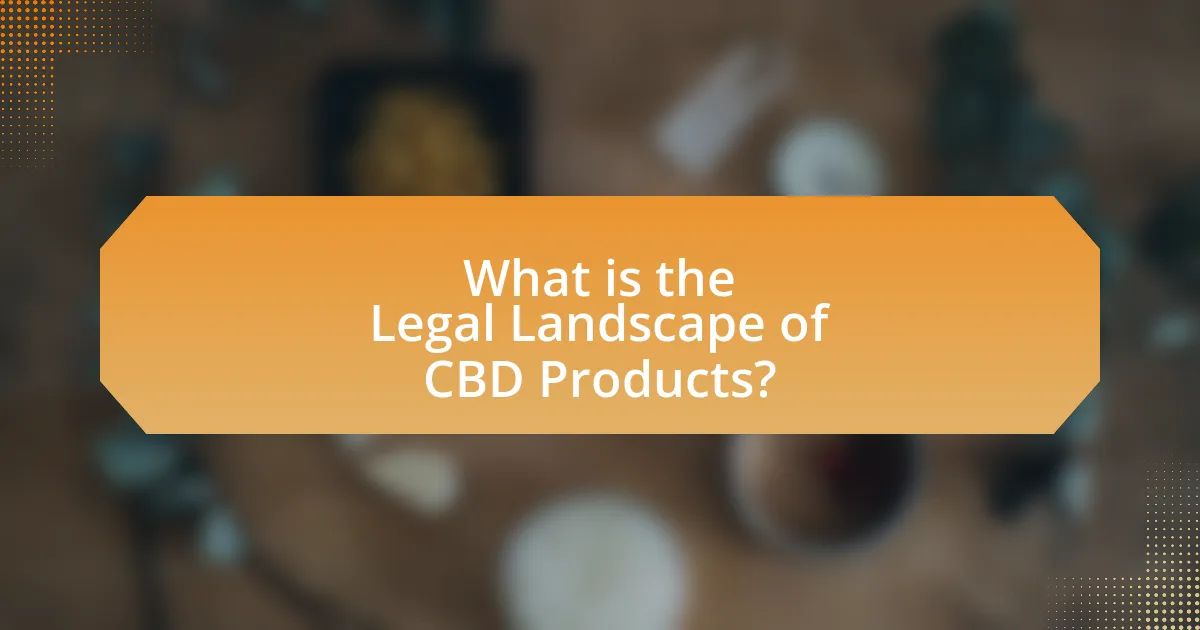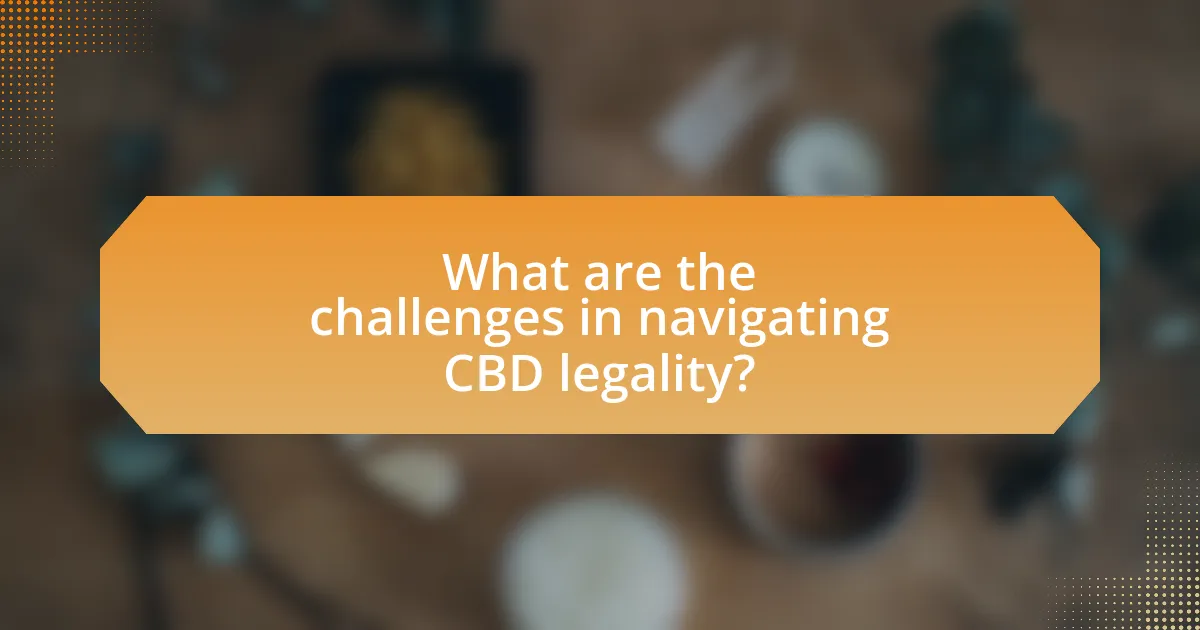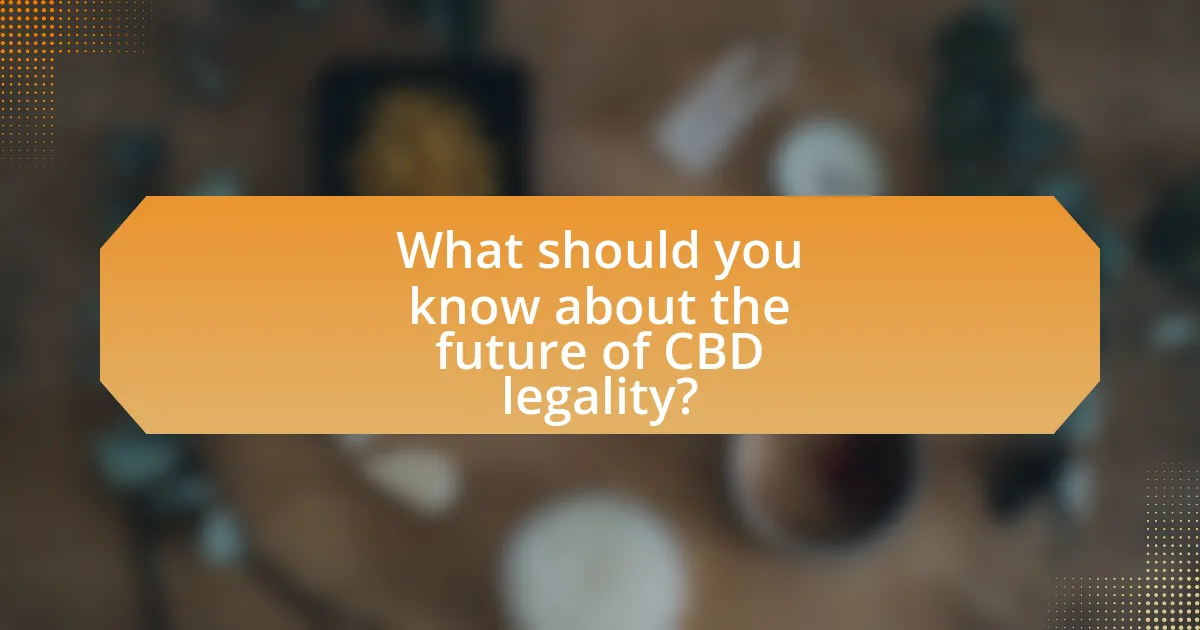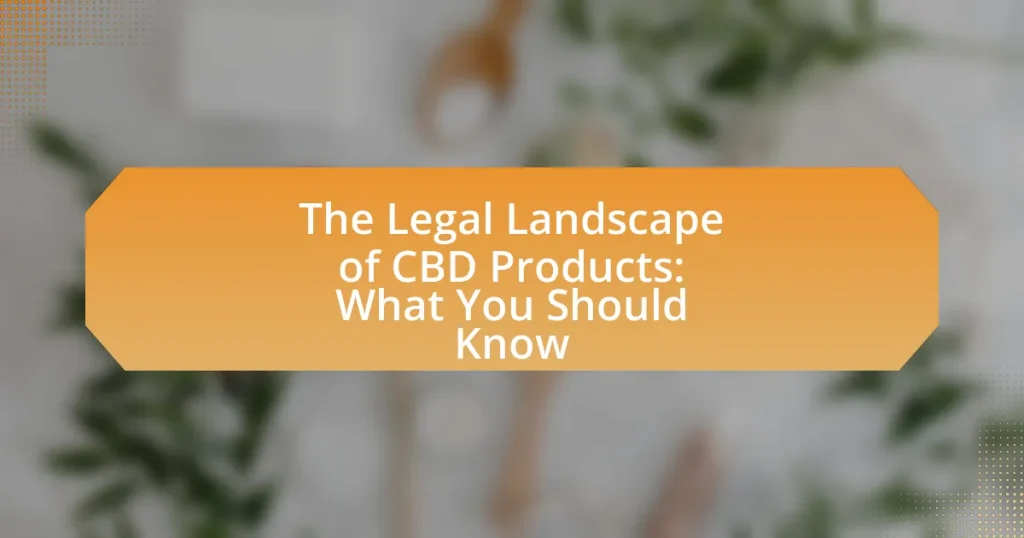The legal landscape of CBD products is primarily shaped by the 2018 Farm Bill, which legalized hemp-derived CBD containing less than 0.3% THC at the federal level in the United States. This legislation allows for the cultivation, processing, and sale of CBD, but individual states can impose their own regulations, resulting in a complex patchwork of laws. The article explores the evolution of CBD’s legal status, key legislation affecting its classification, and the differences between federal and state laws. It also addresses the implications of the Farm Bill, the challenges consumers and businesses face regarding compliance, and the future of CBD legality, including emerging trends and best practices for navigating this evolving market.

What is the Legal Landscape of CBD Products?
The legal landscape of CBD products is primarily defined by the 2018 Farm Bill, which legalized hemp-derived CBD containing less than 0.3% THC at the federal level in the United States. This legislation allows for the cultivation, processing, and sale of hemp and its derivatives, including CBD, provided they meet the specified THC threshold. However, individual states have the authority to impose their own regulations, leading to a patchwork of laws where some states have fully legalized CBD, while others maintain restrictions or outright bans. For instance, states like California and Colorado have established comprehensive frameworks for CBD sales, whereas states like Idaho have stricter regulations. Additionally, the FDA has not yet established a clear regulatory pathway for CBD in food and dietary supplements, creating further uncertainty in the market.
How has the legal status of CBD evolved over time?
The legal status of CBD has evolved significantly, particularly since the 2018 Farm Bill, which legalized hemp-derived CBD containing less than 0.3% THC at the federal level in the United States. Prior to this, CBD was largely classified as a controlled substance due to its association with marijuana, which was illegal under federal law. The 2018 legislation marked a pivotal shift, allowing states to regulate CBD products and leading to a surge in market availability. Additionally, the FDA has since begun to explore regulatory frameworks for CBD, indicating ongoing changes in its legal landscape.
What key legislation has shaped the current legal framework for CBD?
The key legislation that has shaped the current legal framework for CBD is the Agricultural Improvement Act of 2018, commonly known as the Farm Bill. This legislation legalized hemp-derived CBD products containing less than 0.3% THC at the federal level, thus removing hemp from the Controlled Substances Act. The Farm Bill’s passage has enabled the growth of the CBD market and established a regulatory framework for its production and sale, allowing states to regulate hemp cultivation and CBD products within their jurisdictions.
How do state laws differ from federal laws regarding CBD?
State laws regarding CBD often differ significantly from federal laws, primarily in terms of legality, regulation, and usage. While federal law, specifically the 2018 Farm Bill, legalized hemp-derived CBD containing less than 0.3% THC, many states have enacted their own laws that may impose stricter regulations or outright bans on CBD products. For example, some states allow CBD in food and beverages, while others prohibit it. Additionally, states may have varying requirements for labeling, testing, and distribution of CBD products, leading to a patchwork of regulations across the country. This divergence creates confusion for consumers and businesses alike, as compliance with both state and federal laws is necessary to avoid legal issues.
What are the main legal classifications of CBD products?
The main legal classifications of CBD products are hemp-derived CBD and marijuana-derived CBD. Hemp-derived CBD is legal under the 2018 Farm Bill in the United States, provided it contains less than 0.3% THC, while marijuana-derived CBD remains illegal federally and is subject to state laws that vary widely. This classification is supported by the legal distinction made in the Farm Bill, which defines hemp as cannabis with low THC content, thus allowing for its cultivation and sale across state lines.
What distinguishes hemp-derived CBD from marijuana-derived CBD?
Hemp-derived CBD is distinguished from marijuana-derived CBD primarily by its source and legal status. Hemp-derived CBD comes from cannabis plants that contain 0.3% or less THC, making it legal under the 2018 Farm Bill in the United States. In contrast, marijuana-derived CBD is sourced from cannabis plants that typically contain higher levels of THC, which is classified as a controlled substance in many jurisdictions. This legal distinction affects the availability and regulation of these products, with hemp-derived CBD being more widely accessible due to its compliance with federal law.
How are CBD products categorized in terms of legality?
CBD products are categorized in terms of legality primarily based on their source and THC content. Federally in the United States, CBD derived from hemp containing less than 0.3% THC is legal under the 2018 Farm Bill, while CBD from marijuana plants, which typically have higher THC levels, remains illegal federally but may be legal in certain states. This distinction is crucial as it determines the regulatory framework governing the sale and use of CBD products across different jurisdictions.
What are the implications of the 2018 Farm Bill on CBD legality?
The 2018 Farm Bill legalized hemp-derived CBD by removing hemp from the definition of marijuana under the Controlled Substances Act. This legislative change allows for the cultivation, processing, and sale of hemp and its derivatives, including CBD, provided they contain no more than 0.3% THC. The bill’s passage has led to a significant increase in the availability of CBD products across the United States, as states can regulate these products without federal interference, provided they comply with the established THC limit.
How does the Farm Bill define hemp and its derivatives?
The Farm Bill defines hemp as Cannabis sativa L. and specifically excludes it from the definition of marijuana, provided that it contains no more than 0.3% delta-9 tetrahydrocannabinol (THC) on a dry weight basis. This definition allows for the cultivation, processing, and sale of hemp and its derivatives, including CBD, as long as they meet the THC threshold. The legal framework established by the Farm Bill, enacted in 2018, facilitates the growth of the hemp industry by removing federal restrictions on hemp production and enabling states to regulate its cultivation.
What restrictions does the Farm Bill impose on CBD products?
The Farm Bill imposes several restrictions on CBD products, primarily defining that CBD derived from hemp must contain no more than 0.3% THC by dry weight. This legal framework ensures that CBD products are classified as hemp and not marijuana, which remains illegal under federal law. Additionally, the Farm Bill mandates that CBD products must be produced in compliance with state regulations and cannot be marketed as dietary supplements or food additives unless approved by the FDA. These restrictions are designed to regulate the safety and legality of CBD products in the market.
How do regulations affect the sale and distribution of CBD products?
Regulations significantly impact the sale and distribution of CBD products by establishing legal frameworks that dictate what can be sold, how it can be marketed, and the standards for production. For instance, the 2018 Farm Bill legalized hemp-derived CBD with less than 0.3% THC at the federal level, allowing for broader market access. However, individual states have the authority to impose stricter regulations, leading to a patchwork of laws that can affect product availability and compliance requirements. Additionally, the FDA has not yet established comprehensive regulations for CBD in food and dietary supplements, creating uncertainty for businesses regarding labeling and safety standards. This regulatory environment influences market dynamics, consumer trust, and the overall growth of the CBD industry.
What labeling requirements must CBD products meet?
CBD products must meet specific labeling requirements that include the product’s name, the amount of CBD per serving, a list of ingredients, the net weight or volume, and the manufacturer’s contact information. Additionally, labels must indicate whether the product contains THC and provide a disclaimer stating that the product is not intended to diagnose, treat, cure, or prevent any disease. These requirements are enforced by the FDA and vary by state, ensuring consumer safety and transparency in the market.
How do marketing regulations impact CBD businesses?
Marketing regulations significantly impact CBD businesses by restricting how they can promote their products. These regulations often prohibit claims related to health benefits, which limits the ability of CBD companies to communicate the potential advantages of their products to consumers. For instance, the FDA has issued warnings to CBD businesses for making unsubstantiated health claims, which can lead to legal repercussions and financial penalties. Additionally, marketing regulations can vary by state, creating a complex landscape that requires businesses to navigate carefully to avoid compliance issues. This regulatory environment can hinder market growth and innovation within the CBD sector, as companies must invest resources in legal compliance rather than product development or marketing strategies.

What are the challenges in navigating CBD legality?
Navigating CBD legality presents challenges due to varying regulations across jurisdictions. In the United States, for example, the 2018 Farm Bill legalized hemp-derived CBD at the federal level, yet individual states have enacted their own laws that may restrict or regulate its sale and use differently. This inconsistency creates confusion for consumers and businesses alike, as some states may classify CBD as a controlled substance while others permit its use in food and beverages. Additionally, the lack of clear FDA regulations on CBD products further complicates the landscape, as companies face uncertainty regarding labeling, marketing, and safety standards. These factors contribute to a complex legal environment that requires careful navigation to ensure compliance.
Why is there confusion surrounding CBD legality?
Confusion surrounding CBD legality arises primarily from varying state and federal regulations. The 2018 Farm Bill legalized hemp-derived CBD at the federal level, but individual states have enacted their own laws that may restrict or regulate CBD differently. For instance, some states allow CBD in food and beverages, while others prohibit it entirely. Additionally, the lack of clear guidelines from the FDA regarding CBD’s use in food and dietary supplements further complicates the legal landscape, leading to inconsistent enforcement and consumer uncertainty.
What role do varying state laws play in this confusion?
Varying state laws significantly contribute to confusion regarding CBD products by creating a patchwork of regulations that differ widely across the United States. For instance, while the 2018 Farm Bill legalized hemp-derived CBD at the federal level, individual states have enacted their own laws that may restrict or regulate CBD differently, leading to inconsistencies. In states like California, CBD is widely accepted and available in various forms, whereas states like Idaho have stringent restrictions that classify CBD as illegal unless it meets specific criteria. This inconsistency in state laws can lead to misunderstandings among consumers and businesses about the legality and safety of CBD products, complicating compliance and enforcement efforts.
How do enforcement practices differ across jurisdictions?
Enforcement practices regarding CBD products differ significantly across jurisdictions due to varying state and federal regulations. For instance, some states have fully legalized CBD derived from hemp, while others maintain strict prohibitions, leading to inconsistent enforcement levels. In states like Colorado and California, regulatory frameworks are established, allowing for commercial sales and clear guidelines, whereas states such as Idaho and South Dakota have stringent laws that classify CBD as illegal, resulting in law enforcement actively pursuing violations. This disparity is further evidenced by the 2018 Farm Bill, which legalized hemp-derived CBD at the federal level, yet individual states retain the authority to impose their own regulations, creating a patchwork of enforcement practices across the United States.
What legal risks do consumers and businesses face with CBD products?
Consumers and businesses face significant legal risks with CBD products primarily due to varying state and federal regulations. The legality of CBD is complex; while the 2018 Farm Bill legalized hemp-derived CBD at the federal level, many states have their own laws that may restrict its sale and use. For instance, some states classify CBD as a controlled substance, leading to potential criminal charges for possession or distribution. Additionally, businesses risk liability from misleading marketing claims, as the Federal Trade Commission (FTC) actively enforces against false advertising in the CBD industry. Furthermore, the lack of FDA regulation means that product quality and safety can vary widely, exposing consumers to health risks and potential legal action if products cause harm.
What potential liabilities exist for CBD manufacturers?
CBD manufacturers face several potential liabilities, primarily related to product safety, labeling accuracy, and regulatory compliance. These manufacturers can be held liable for selling products that contain harmful substances or inaccurate concentrations of CBD, which can lead to consumer health issues. For instance, a study published in the Journal of the American Medical Association found that nearly 70% of CBD products tested were mislabeled regarding their CBD content, exposing manufacturers to legal claims for false advertising and consumer fraud. Additionally, failure to comply with state and federal regulations, such as the FDA’s guidelines on health claims, can result in penalties and lawsuits. Overall, the combination of product mislabeling, safety concerns, and regulatory non-compliance creates significant legal risks for CBD manufacturers.
How can consumers protect themselves when purchasing CBD products?
Consumers can protect themselves when purchasing CBD products by ensuring they buy from reputable sources that provide third-party lab testing results. Reputable brands often publish Certificates of Analysis (COAs) that confirm the product’s cannabinoid content and verify the absence of harmful substances. According to a 2020 study published in the Journal of the American Medical Association, nearly 70% of CBD products sold online were inaccurately labeled, highlighting the importance of transparency in product testing. By checking for COAs and purchasing from established companies, consumers can mitigate the risks associated with misleading product claims and ensure they are receiving safe and effective CBD products.

What should you know about the future of CBD legality?
The future of CBD legality is likely to evolve towards broader acceptance and regulation, driven by increasing consumer demand and ongoing research into its benefits. As of now, the 2018 Farm Bill legalized hemp-derived CBD at the federal level in the United States, provided it contains less than 0.3% THC. However, individual states have the authority to impose their own regulations, leading to a patchwork of laws across the country. Recent trends indicate that more states are moving towards legalization and regulation, as evidenced by the growing number of states that have enacted laws to regulate CBD products, ensuring safety and quality standards. Additionally, the FDA is actively working on establishing guidelines for CBD, which could further clarify its legal status and promote consistency in the market.
How might upcoming legislation impact the CBD market?
Upcoming legislation may significantly impact the CBD market by establishing clearer regulatory frameworks that govern production, distribution, and marketing practices. For instance, the proposed regulations could enforce stricter quality control measures and labeling requirements, which would enhance consumer safety and trust. Additionally, legislation that addresses the legality of CBD in various states could either expand market access or impose restrictions, influencing the overall growth and investment in the sector. Historical context shows that the 2018 Farm Bill, which legalized hemp-derived CBD, led to a surge in market growth, indicating that future legislative changes could similarly reshape the landscape.
What trends are emerging in CBD regulation?
Emerging trends in CBD regulation include increased state-level legalization, the establishment of clearer labeling and quality standards, and the push for federal oversight. As of 2023, over 30 states have legalized CBD products, reflecting a growing acceptance and demand. Additionally, organizations like the FDA are working towards defining regulations that ensure product safety and efficacy, which is crucial given that the CBD market is projected to reach $20 billion by 2024. These trends indicate a shift towards a more structured regulatory framework aimed at consumer protection and industry accountability.
How could international laws influence the U.S. CBD market?
International laws could significantly influence the U.S. CBD market by establishing regulatory frameworks that affect trade, import/export restrictions, and compliance standards. For instance, the United Nations’ 2018 decision to remove CBD from the list of controlled substances has encouraged countries to adopt more favorable regulations, which can lead to increased international trade opportunities for U.S. CBD products. Additionally, compliance with international standards, such as those set by the World Health Organization, may compel U.S. companies to adhere to stricter quality and safety regulations, thereby impacting product formulation and market access.
What best practices should businesses follow to remain compliant?
Businesses should implement a comprehensive compliance program that includes understanding and adhering to federal, state, and local regulations regarding CBD products. This involves regularly reviewing the legal landscape, as laws can vary significantly by jurisdiction and are subject to change. For instance, the 2018 Farm Bill legalized hemp-derived CBD at the federal level, but individual states may have additional restrictions or requirements.
Additionally, businesses should ensure accurate labeling and marketing of their products, as misleading claims can lead to regulatory scrutiny. The FDA has specific guidelines regarding health claims associated with CBD, and non-compliance can result in enforcement actions. Regular training for employees on compliance issues and maintaining thorough documentation of sourcing, testing, and sales practices further supports adherence to legal standards.
By following these best practices, businesses can mitigate risks and maintain compliance in the evolving legal landscape of CBD products.
How can businesses stay updated on changing regulations?
Businesses can stay updated on changing regulations by subscribing to industry newsletters, attending relevant conferences, and consulting legal experts. These methods provide timely information on regulatory changes specific to the CBD industry, which is subject to frequent updates due to evolving laws at both state and federal levels. For instance, the 2018 Farm Bill significantly altered the legal status of hemp-derived CBD, highlighting the necessity for businesses to remain vigilant and informed. Additionally, organizations like the Hemp Industries Association offer resources and updates that can help businesses navigate the complex regulatory landscape.
What resources are available for legal guidance in the CBD industry?
Legal guidance resources in the CBD industry include law firms specializing in cannabis law, industry associations like the National Cannabis Industry Association, and government websites such as the U.S. Food and Drug Administration. These resources provide up-to-date information on regulations, compliance requirements, and legal best practices specific to CBD products. For instance, the National Cannabis Industry Association offers legal resources and advocacy efforts that help businesses navigate the complex legal landscape. Additionally, law firms often publish articles and guides that detail state-specific laws and federal regulations, ensuring that stakeholders are informed about their legal obligations.
What practical tips can consumers use when purchasing CBD products?
Consumers should verify the source and quality of CBD products before purchasing. This involves checking for third-party lab testing results, which confirm the product’s cannabinoid content and ensure it is free from harmful contaminants. According to a 2020 study published in the Journal of the American Medical Association, many CBD products on the market do not contain the levels of CBD they claim, highlighting the importance of transparency from manufacturers. Additionally, consumers should look for products that provide clear labeling, including the amount of CBD per serving and the type of CBD used (full-spectrum, broad-spectrum, or isolate). Understanding the legal status of CBD in their region is also crucial, as regulations can vary significantly.



